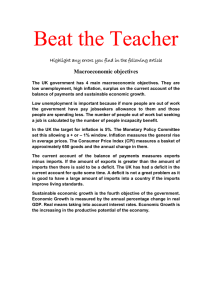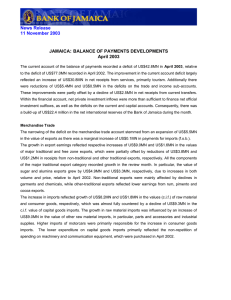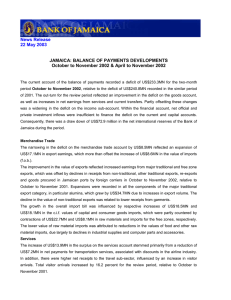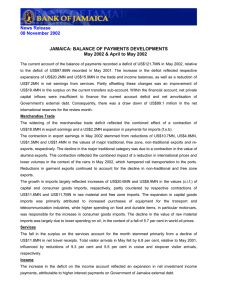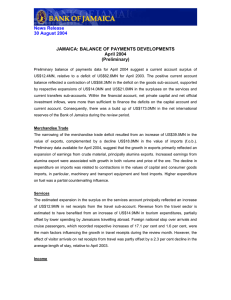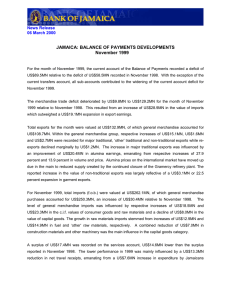: News Release 07 October 2003
advertisement
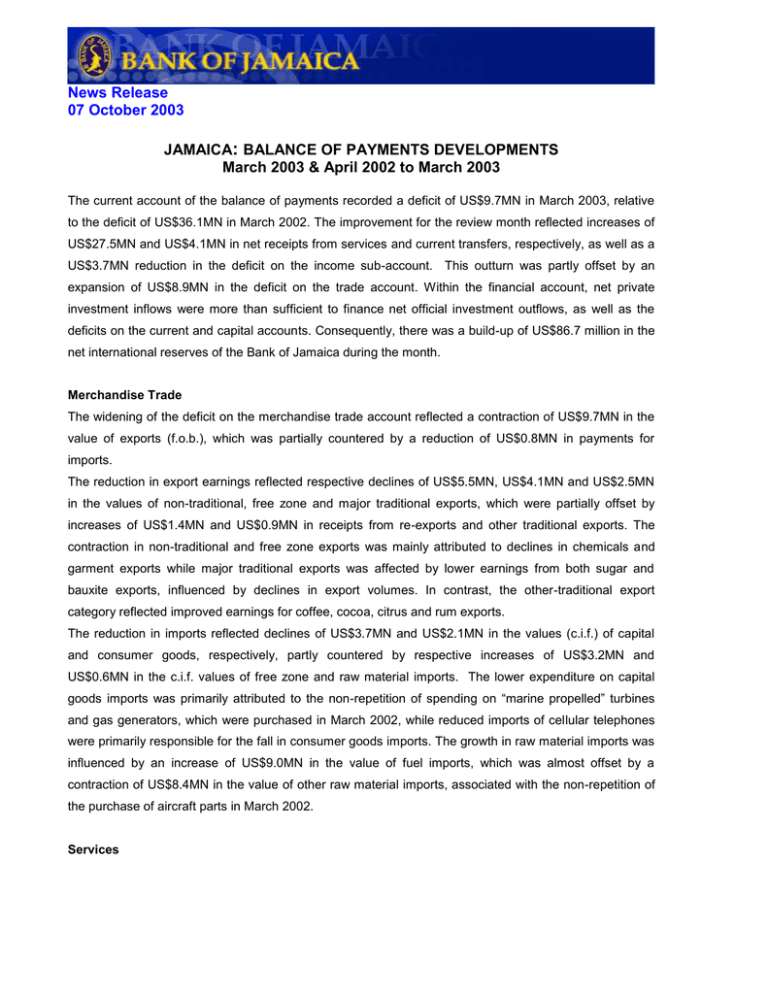
News Release 07 October 2003 JAMAICA: BALANCE OF PAYMENTS DEVELOPMENTS March 2003 & April 2002 to March 2003 The current account of the balance of payments recorded a deficit of US$9.7MN in March 2003, relative to the deficit of US$36.1MN in March 2002. The improvement for the review month reflected increases of US$27.5MN and US$4.1MN in net receipts from services and current transfers, respectively, as well as a US$3.7MN reduction in the deficit on the income sub-account. This outturn was partly offset by an expansion of US$8.9MN in the deficit on the trade account. Within the financial account, net private investment inflows were more than sufficient to finance net official investment outflows, as well as the deficits on the current and capital accounts. Consequently, there was a build-up of US$86.7 million in the net international reserves of the Bank of Jamaica during the month. Merchandise Trade The widening of the deficit on the merchandise trade account reflected a contraction of US$9.7MN in the value of exports (f.o.b.), which was partially countered by a reduction of US$0.8MN in payments for imports. The reduction in export earnings reflected respective declines of US$5.5MN, US$4.1MN and US$2.5MN in the values of non-traditional, free zone and major traditional exports, which were partially offset by increases of US$1.4MN and US$0.9MN in receipts from re-exports and other traditional exports. The contraction in non-traditional and free zone exports was mainly attributed to declines in chemicals and garment exports while major traditional exports was affected by lower earnings from both sugar and bauxite exports, influenced by declines in export volumes. In contrast, the other-traditional export category reflected improved earnings for coffee, cocoa, citrus and rum exports. The reduction in imports reflected declines of US$3.7MN and US$2.1MN in the values (c.i.f.) of capital and consumer goods, respectively, partly countered by respective increases of US$3.2MN and US$0.6MN in the c.i.f. values of free zone and raw material imports. The lower expenditure on capital goods imports was primarily attributed to the non-repetition of spending on “marine propelled” turbines and gas generators, which were purchased in March 2002, while reduced imports of cellular telephones were primarily responsible for the fall in consumer goods imports. The growth in raw material imports was influenced by an increase of US$9.0MN in the value of fuel imports, which was almost offset by a contraction of US$8.4MN in the value of other raw material imports, associated with the non-repetition of the purchase of aircraft parts in March 2002. Services The increase in the surplus on the services account stemmed mainly from an expansion of US$21.2MN in net receipts from the travel sub-sector. Contributing to this outturn was an increase of 23.1 per cent in total visitor arrivals, largely driven by a 61.9 per cent expansion in cruise passenger arrivals for the month, relative to March 2002. In addition, there was a reduction of US$10.8MN in the expenditure of Jamaicans traveling abroad. Income The narrowing in the deficit on the income account in March 2003 was attributable to a reduction in the imputed profit remittances of the direct investment companies, which was partly offset by higher interest payments on Government of Jamaica external debt. Current Transfers The growth in net current transfers for the review month stemmed from an increase of US$5.4MN in net private sector inflows. Capital and Financial Accounts A deficit of US$1.8MN was recorded on the capital account, in contrast to a surplus of US$11.5MN on the financial account. Within the financial account, net private investment inflows of US$109.9MN were more than sufficient to finance net official investment outflows of US$11.7MN, as well as the deficits on the current and capital accounts. In this context, the net international reserves of the Bank of Jamaica went up by US$86.7MN during the month. Fiscal Year (FY) 2002/03 For the fiscal period April 2002 to March 2003, the current account deficit amounted to US$1181.5MN, compared with a deficit of US$763.9MN recorded for FY 2001/02. This out-turn reflected expansions of US$421.1MN and US$167.4MN in the deficits on the trade and income sub-accounts, respectively. These were partly offset by respective improvements of US$138.9MN and US$32.0MN in the surpluses on the current transfers and services sub- accounts. Within the financial account, net private investment inflows were insufficient to finance official capital outflows, as well as the deficits on the current and capital accounts. Consequently, there was a draw down of US$602.0 million in the net international reserves over the period. Merchandise Trade The increase in the merchandise trade deficit in the review period, relative to FY 2001/02, stemmed from a reduction of US$120.9MN in export receipts, as well as an increase of US$300.2MN in payments for imports (f.o.b.). With the exception of other traditional exports, all the export categories registered declines during the review period. Non-traditional and free zone exports contracted by US$63.4MN and US$37.4MN, respectively, largely reflecting reductions in earnings from garment exports. There were also declines of US$18.0MN, US$4.2MN and US$0.5MN in the values of and major traditional exports, goods procured in ports and re-exports, respectively, for the review period. The fall in major traditional exports reflected reductions in all components, with the exception of bauxite exports. In particular, the value of alumina fell by US$15.2MN, due to a fall in price. With regard to the expansion in imports, increased spending of US$157.7MN, US$113.7MN and US$108.9MN on raw materials, consumer goods and capital goods, respectively, were partly offset by a contraction of US$42.0MN in the value of free zone imports in F/Y 2002/03, compared with F/Y 2001/2002. The growth in raw material imports was associated with a higher value for fuel imports, while the increase in consumer goods imports stemmed from additional spending on mobile telephones, food and motorcars. The expansion in capital goods imports reflected higher spending on communication, transport and construction equipment. Services The improvement in the surplus on the services account in F/Y 2002/03 relative to the period April 2001 to March 2002 was influenced by an increase of US$68.2MN in net receipts from travel and a reduction of US$12.5MN in the deficit on the transportation sub-account. Partly countering this change was an expansion of US$48.7MN in net payments for other services. The higher receipts from the travel sector were mainly attributed to an expansion of US$85.3MN in gross travel inflows, reflecting expansions of 4.4 per cent and 23.7 percent in foreign national stopover and cruise arrivals, respectively, relative to FY 2001/02. Growth in net payments for other services was associated largely with higher travel commissions, as well as increases in insurance premiums and payments for communication services. Transportation services were influenced by an improvement in visitor arrivals, which was partially offset by higher freight charges due to increased imports during the review period. Income The expansion in the deficit on the income account for the review period was mainly attributable to an increase in the imputed profit remittances of the direct investment companies, as well as higher interest payments on Government of Jamaica external debt. Current Transfers The increase in net receipts from current transfers for F/Y 2002/03 when compared to FY2001/02, resulted from growth of US$151.3MN in net inflows to the private sector, which was partly offset by a decline of US$12.4MN in net official transfers. Capital & Financial Accounts A deficit of US$16.3MN was recorded on the capital account for April 2002 to March 2003, while the financial account registered a surplus of US$1197.8MN. Within the financial account, net private investment inflows of US$822.4MN were insufficient to finance net official outflows of US$226.5MN, as well as the deficits on the current and capital accounts. Consequently, there was a draw down of US$602.0MN in the net international reserves of the Bank of Jamaica. At the end of March 2003, the level of gross reserves was US$1,382.2MN, representing approximately 21.8 weeks of imports of goods and 14.5 weeks of imports of goods and services. The following table shows the balance of payments for March 2002, March 2003 and for the periods April 2001 to March 2002 and April 2002 to March 2003. BALANCE OF PAYMENTS SUMMARY (US$MN) March1/ March2/ 2002 2003 Change -9.7 Apr 2001March1/ Apr 2002March2/ 2002 2003 Change 1. CURRENT ACCOUNT -36.1 26.4 -763.9 -1181.5 -417.6 A. GOODS and SERVICES -77.4 -58.8 18.6 -1265.0 -1654.1 -389.1 a. GOODS BALANCE -118.2 -127.1 -8.9 -1577.3 -1988.4 -421.1 Exports (f.o.b.) 131.5 121.8 -9.7 1423.7 1302.8 -120.9 Imports (f.o.b.) 249.7 248.9 -0.8 3001.9 3301.2 300.2 b. SERVICES BALANCE 40.8 68.3 27.5 312.3 344.3 32.0 Transportation -15.2 -8.7 6.5 -253.7 -241.2 12.5 Travel 93.6 114.8 21.2 955.6 1023.8 68.2 Other Services -37.6 -37.8 -0.2 -389.6 -438.3 -48.7 -46.3 -42.6 3.7 -457.6 -625.0 -167.4 0.1 0.3 0.2 73.4 84.0 10.6 Investment Income -46.4 -42.9 3.5 -531.0 -709.0 -178.0 C. CURRENT TRANSFERS 87.6 91.7 4.1 958.7 1097.6 138.9 Official 8.6 7.3 -1.3 116.5 104.1 -12.4 Private 79.0 84.4 5.4 842.2 993.5 151.3 2. CAPITAL & FINANCIAL ACCOUNT 36.1 9.7 -26.4 763.9 1181.5 417.6 A. CAPITAL ACCOUNT -2.1 -1.8 0.3 -24.2 -16.3 7.9 a. Capital Transfers -2.1 -1.8 0.3 -24.2 -16.3 7.9 Official 0.0 0.0 0.0 0.4 0.2 -0.2 Private -2.1 -1.8 0.3 -24.6 -16.5 8.1 b. Acq/disposal of non-prod. Non-fin'l assets 0.0 0.0 0.0 0.0 0.0 0.0 B. FINANCIAL ACCOUNT 38.2 11.5 -26.7 788.1 1197.8 409.7 Other official investment 40.5 -11.7 -52.2 590.5 -226.5 -817.0 Other private investment 3/ 118.5 109.9 -8.6 853.0 822.3 -30.6 Change in Reserves (minus = increase) -120.8 -86.7 -655.4 602.0 B. INCOME Compensation of employees 1/ Revised 2/ Provisional 3/ Includes errors & omissions BANK OF JAMAICA
